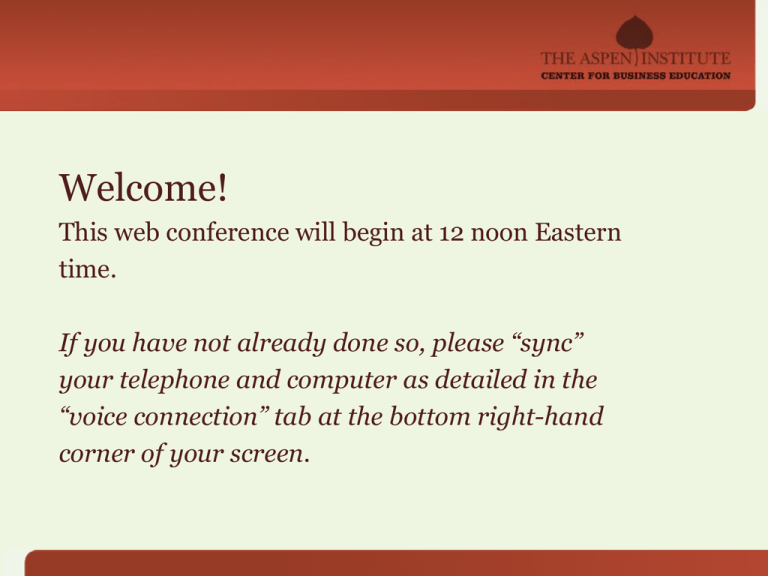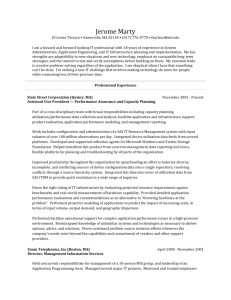
Welcome!
This web conference will begin at 12 noon Eastern
time.
If you have not already done so, please “sync”
your telephone and computer as detailed in the
“voice connection” tab at the bottom right-hand
corner of your screen.
Low-Wage Workers in the Coming
Economy
Speakers
Stacy Blake-Beard, Associate Professor of Management, Simmons
College School of Management
Ellen Ernst Kossek, University Distinguished Professor, Michigan
State University School of Labor & Industrial Relations
Mark Popovich, Senior Program Officer, The Hitachi Foundation
Moderator
Maureen Scully, Assistant Professor of Management,
UMASS-Boston
Employer Investment in Lower-Wage
Workers:
Findings from the
State of Corporate Citizenship
2009 Survey
Mark Popovich
Senior Program Officer
The Hitachi Foundation
Embargoed - Do NOT Release
without Permission of The Hitachi
3
About The Hitachi Foundation
- An independent nonprofit philanthropy established by Hitachi in 1985
- The Foundation believes that business has an essential role to play
in addressing many complex global challenges of our time
- Our mission is to forge an authentic integration of business actions
and societal well-being in North America
- We do so by discovering and expanding business practices that
measurably improve the lives of economically distressed people
and enhance business value
Embargoed - Do NOT Release
without Permission of The Hitachi
4
About the Survey and Our Goals
- Derived from survey research conducted every two years with the
Boston College Center for Corporate Citizenship
- Phone survey by GlobeScan of a nationally representative sample of
756 small, medium, and large companies
- Added questions on company practices and investments affecting the
the training, education, and career advancement of lower income workers
- Business commits over $100 billion annually to talent development. That is
many times greater than public funding for workforce development
- Lower-income workers are integral to many businesses. Effective development
efforts can benefit both employees and the business bottom line
Embargoed - Do NOT Release
without Permission of The Hitachi
5
Selling to
Embargoed - Do NOT Release
without Permission of The Hitachi
6
36% Sharp
Decline
49% Stable
15% Significant
Increases
Embargoed - Do NOT Release
without Permission of The Hitachi
Percent of Companies with Layoffs by Company Size
Embargoed - Do NOT Release
without Permission of The Hitachi
8
Lower-wage
workers are an
integral part of
the business model
for more than half
of all businesses
36%
16%
52%
Embargoed - Do NOT Release
without Permission of The Hitachi
9
Embargoed - Do NOT Release
without Permission of The Hitachi
10
Embargoed - Do NOT Release
without Permission of The Hitachi
11
Q: Why do you support skill development for employees making less than $40,000 annually?
Note: Results are from a subsample of 596 who report they support skill development for employees making
less than $40k/year. Option to select two most important reasons.
Embargoed - Do NOT Release
without Permission of The Hitachi
12
Note: Subsample of 156 companies who say they do NOT support the skill development, ed, and career
Adv of under $40k/yr employees. Prompted to select two most important reasons
Embargoed - Do NOT Release
13
without Permission of The Hitachi
Momentum for Company Investment in
<$40,000 Workers
75%
80%
70%
60%
50%
40%
30%
20%
10%
2%
9%
8%
6%
0%
5- Greatly Inc
4
3-No Change
2
1-Greatly
Decreased
Q: To what extent has your company increased or decreased support for skill development, education, and career advancement
of existing employees earning less than $40,000 annually on a five point scale where 1 =“greatly decreased,” 3 = “no change,”
and 5 =“greatly increased.”
Embargoed - Do NOT Release
without Permission of The Hitachi
14
SIMMONS
School of Management
BOSTON,
BOSTON,
MASSACHUSETTS
MASSACHUSETTS
School of Management
Click to edit Master title style
Bringing Class Into the Classroom:
Cases, Exercises, and Readings
Stacy Blake-Beard, Ph.D.
Simmons College School of Management
Center for Gender in Organizations
stacy.blakebeard@simmons.edu
Aspen Institute Webinar; November 20, 2009
SIMMONS
Diversity means...
School of Management
•
If we were to shrink the world to a village
of exactly 100 people,
–
Half of the world’s wealth would be held by 6 U.S.
citizens.
–
Half of the villagers would suffer from
malnutrition.
–
80 people would live in sub-standard housing.
–
Just 30 people would be able to read.
–
Only one would have a college education.
SIMMONS
School of Management
•
Cases
•
Exercises
•
Readings
Ways to Infuse Class into
the Classroom
SIMMONS
School of Management
•
Donna Klein at Marriott
•
Rachel Hubka
•
The Parable of the Sadhu
Cases
SIMMONS
Exercises
School of Management
•
Power Simulation: Tops, Middles,
Bottoms
•
Experience of Being Other
SIMMONS
Readings
School of Management
•
•
•
•
•
Nickel and Dimed: On (Not) Getting By in
America by Barbara Ehrenreich
Class Matters - Social Class in the United
States of America series in The New York
Times
Where We Stand: Class Matters by bell
hooks
Betrayal at Berkeley: Wages and Working
Conditions at CAL. by Gretchen Purser, Amy
Schalet and Ofer Sharone
White Privilege: Unpacking the Invisible
Knapsack by Peggy McIntosh
SIMMONS
School of Management
The Working Poor: Increasing
Workplace Inclusion As a Diversity
Management & Organizational
Change Initiative
Dr. Ellen Ernst Kossek
University Distinguished Professor
Michigan State University
School of Labor and Industrial Relations
Center for Work Family Stress Safety and Health
http://wfsupport.psy.pdx.edu/ and http://ellenkossek.lir.msu.edu/
kossek@msu.edu
Aspen Institute Webinar November 20, 2009
The Inclusive Workplace
Micro • Values and utilizes individual and inter-group differences within its
workforce
• Cooperates with, and contributes to, its surrounding community
• Alleviates the needs of disadvantaged groups in its wider
environment
• Collaborates with individuals, groups, and organizations across
national and cultural boundaries
• From Mor Barak (2008)
Macro
© 2007 Thomson/SouthWestern. All rights reserved.
1–23
Stereotypes and Prejudice
Definitions
A stereotype is a standardized oversimplified mental picture that
is held in common by members of a group
A prejudice is derived from the verb to ‘prejudge’ and refers to a
preconceived judgment or opinion held by members of a group.
Most commonly, a prejudice is perceived as an irrational attitude
of hostility or indifference directed against an individual, a
group, a race, or their supposed characteristics
•
Dehumanization is a psychological mechanism in viewing members of other
groups as inferior, and its behavioral manifestation is oppression.
© 2007 Thomson/SouthWestern. All rights reserved.Source Bell 2007
1–24
Workplace Interventions to Increase Inclusion
of Working Poor: Weaving into Employing
Organizations:
• Supportive Organizational Policy and Structures
• Changing the Organization Culture
• Management Skills & Techniques
• Increasing Accountability and Measurement of the
Impact of Diversity Initiatives
1–25
Example: Workplace Practice, Health
and Well-Being: Initial Research Findings
from the Work, Family & Health
Network
Video: A Better Way to Work
http://www.kpchr.org/workfamilyhealthnetwork/pub
lic/default.aspx
The Effect of Family Supportive
Supervision on Grocery Workers
Dr. Ellen Kossek
Dr. Leslie B. Hammer
Michigan State University Portland State
University
Overview of Research
Training Supervisors to Support Grocery Workers’
Family and Personal Lives
TYPES OF SUPERVISORY SUPPORT
FOR FAMILY
■ Emotional Support for Family
■ Practical Support with Scheduling Conflicts
■ Work-Family Role Modeling
■ Creative Work-Family Management
■ Source: Hammer, Kossek, & Bodner ,Yragui 2009. Journal of Management
Baseline Findings
Workers supervised by family-supportive managers
are more likely to experience:
Lower levels of work and family conflict
Higher job satisfaction
Lower intentions to turnover
Higher reports of mental and physical health
Kossek, E. E., & Hammer, L. B. (November, 2008). Work/Life Training for Supervisors Gets Big Results. Harvard Business Review.
• Most beneficial for
employees with high
family-to-work
conflict
Higher job
satisfaction
Less likely to
want to quit their
job
Better reports of
physical health
Physical Health
Effects of Supervisor Training Intervention: Training buffered
the negative effects of family-to-work conflict on health
Trained
Not Trained
Low FWC
Mean FWC
High FWC
Family-to-Work Conflict
Low-Wage Workers in the Coming
Economy
Speakers
Stacy Blake-Beard, Associate Professor of Management, Simmons
College School of Management
Ellen Ernst Kossek, University Distinguished Professor, Michigan
State University School of Labor & Industrial Relations
Mark Popovich, Senior Program Officer, The Hitachi Foundation
Moderator
Maureen Scully, Assistant Professor of Management, UMASSBoston








